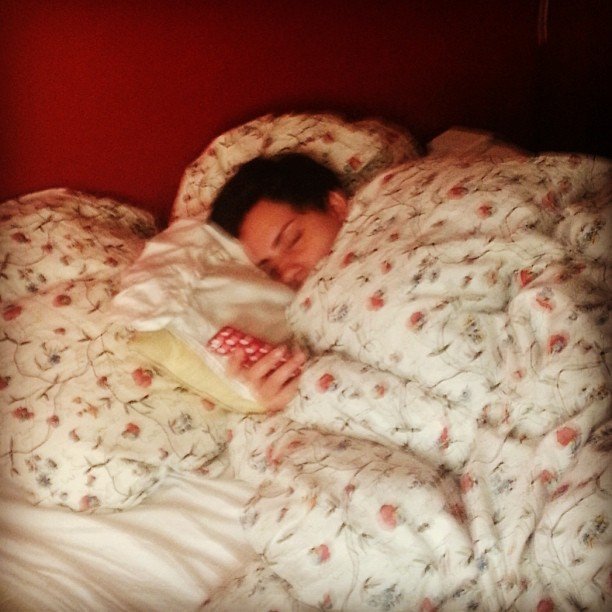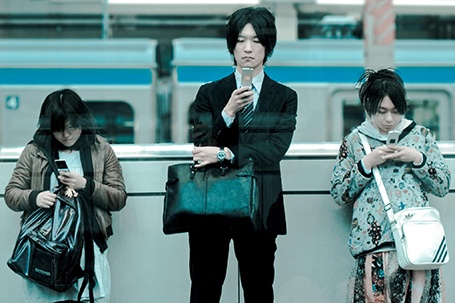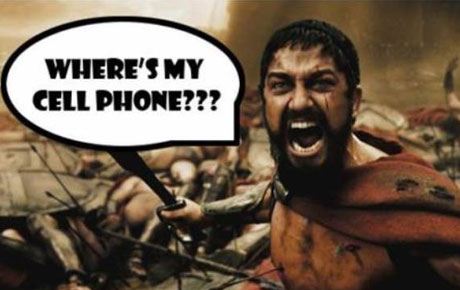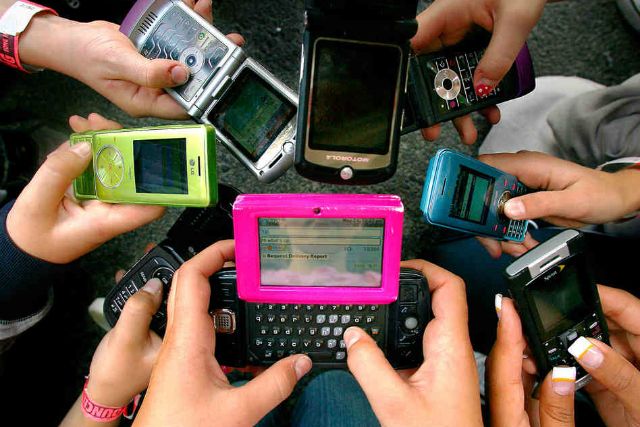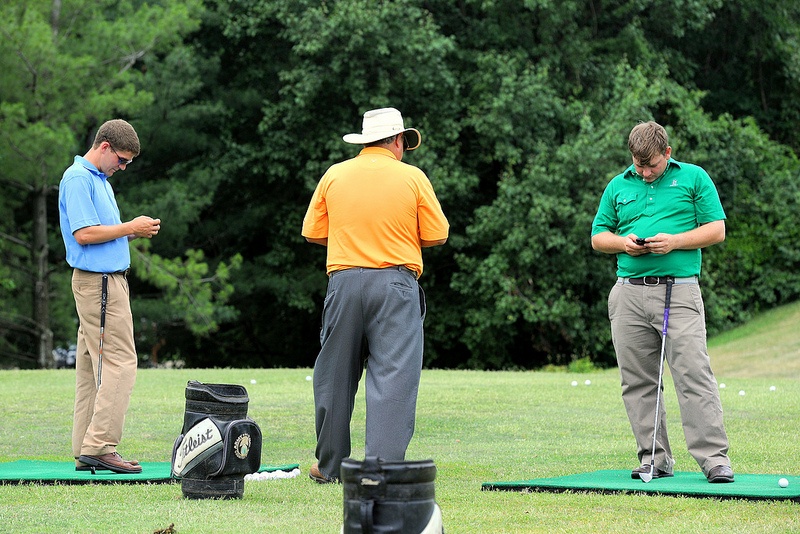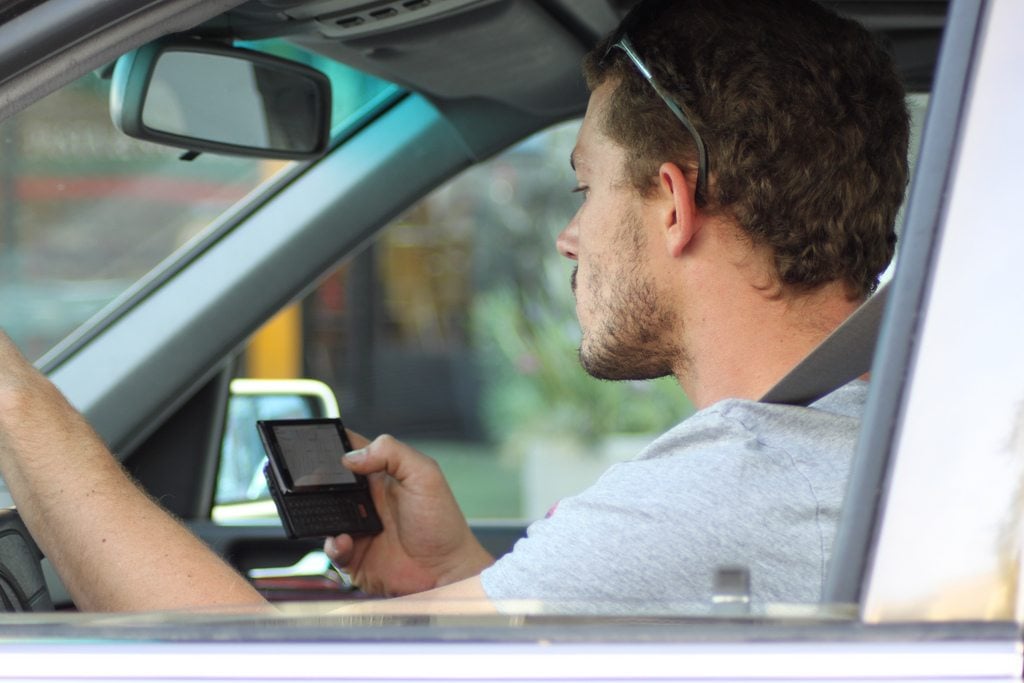1. You take your phone to the bathroom. And use it.
Bathroom time used to be a private experience; now many opt to bring their entire social life right in there with them. They text, chat and share pictures on Facebook or Instagram. Some even take selfies while peeing, or staring at themselves in the mirror. Some say this selfie-obsession is introducing a new rampant form of narcissism. Japanese designers, Panasonic and Fujitsu, have created water-proof, break-proof cell phones that allow users to take a shower with it, so they don’t miss a beat. It’s also protected just in case you drop it in the toilet. If this is you, you may want to try stepping away from your phone when nature calls. Try changing your time in the bathroom to one where you concentrate on your physical needs instead of clinging to a cell phone. Many people feel obligated to be near their phones all day, for work or family needs. If you’re not an on-call emergency doctor or firefighter, you likely have some leeway in your schedule.
2. You are sleeping with your phone.
If your cellphone is the first thing you greet when you awake and the last thing you see before you fall asleep, there’s a problem. Cognitive therapist Dr. Suzanne Phillips notes on her post for PBS that sleeping with a cell phone has negative effects on users. She writes that, ”Texting as an addiction jeopardizes sleep, cognitive functioning and real relating–making dependence on it greater and greater.” If you can’t imagine waking up or falling asleep without something to read or look at, try challenging this pattern by replacing your phone with a book or magazine. You could also write in a journal. If you are coupled, talking to your partner as you fall asleep will offer more comfort and help in building your connection with the one you love. If you need distraction but live alone, you may want to create a playlist with music by instrumentalists like Deuter.
3. Your phone has a place at the dinner table.
If your phone plays center stage at meal time, it’s time to put down the phone. Many of us can’t help photographing the food we are about to ingest and it’s okay, every now and again, especially, if you are a chef or tried and true foodie. But consistently choosing your phone over friends and family when eating is a sign of a potential cell phone addiction. When you feel the need to check in on your social network, send a gratuitous text, or merely stare at your phone while you chew, try instead engaging with the person you are dining with. If alone, enjoy being present with your meal; maybe do some people-watching, read a book, or connect with the servers or the chefs that prepared your meal.
4. You are texting while walking.
This spells disaster. Keep the texting for non-moving times. You are running into people or standing in the middle of the sidewalk as you attend to your phone. You are taking selfies when you should be focusing on getting to your location safely. Just as you wouldn’t drive and text (hopefully!), you shouldn’t text and walk. If you need to, step off to the side. The media have shown unfortunate examples of people texting and walking, unaware of their surroundings. One young woman fell onto the New York City Subway tracks, and got hit!
5. You are hanging out with friends, and you are all busy with your phones.
If hanging out consists of you and your friends sitting in the same room while you play on your cell phones, you are not really building a connection with your friends. The phone might not be huge, but it acts as a very big barrier, stealing your attention from the present moment.
6. You no longer apologize for checking your phone when you are out with someone.
Sure, cell phones have allowed people to keep in touch and make plans with friends, but they have also transformed the dating scene, with many preferring to casually “hang out” and text, instead of creating a real relationship with another. In fact, it’s not entirely common to go on a date and sit in silence as your date fiddles with his phone, or both parties are busy chatting and texting with another person. And not even an apology is given. It’s rude, tacky and immature. If you are out with someone, particularly a potential lover, it’s important to take a break from your phone and get to know the person in front of you. If you’d rather be chatting with someone else, you shouldn’t be out on a date, nor do you deserve to be. Try challenging this bad habit with finding common ground, discussing interests, and engaging your date with intriguing questions or thoughts–minus the phone. You don’t need to text, Yelp, Instagram, Facebook or Tweet every movement, food particle eaten or sarcastic quip. Save the restaurant review until after your date.
7. If you forget your phone, you have a mini panic attack.
This Disconnection Anxiety may seem exaggerated, but it’s very real to the person experiencing it. Studies have noted that most people are within three to five feet of their cell phones at any given time. The mere thought of not having it close by is enough to make some go off the deep end and into full-on rage mode. If your palms sweat, you feel anxious, nervous, agitated or in a hurry to get home, because you are without your phone for a few hours, you need to think about the affect the cellphone has on you and the power you’ve given it. You deserve an afternoon, or two, off. Enjoy a hearty meal, a walk in the park, time playing with your dog, seeing a film, talking with your neighbor or checking out books from the local library in place of your obsessive cell phone usage. If you find that you can’t quit your phone, for even a short while, consider reaching out to a counselor or therapist who can help you make sense of and put into perspective this intense urgency to be connected every waking moment.
8. Your phone has become a status symbol, that you regularly flaunt.
Having a cell phone can get costly. Between downloading apps, music, monthly fees, and even texts, they can cost hundreds of dollars each month. Some phones are even going for $15,000, before monthly fees and other charges. Cell phones have become our modern era’s status symbol. If you not only obsessively use your phone, but use it to show your status in society, or if your phone has become a symbol of your personal worth, it’s time to adjust your idea of self-worth and importance. Remove the focus from the phone and back onto the things that truly matter, like the quality of your life and those you care for.
9. You are out in nature, checking your phone.
Hiking on a beautiful day, playing sports, enjoying a visit to a natural habitat, or time spent in nature demands your full attention. It’s not time to check your cell phone or show off what you’re doing, but take in the experience. This funny and introspective video by YouTube user Charlene deGuzman offers an outside perspective into how your cellphone addiction affects not only you, but also those around you.
10. You are texting and driving.
This is the most dangerous and troubling sign of an unhealthy relationship with your cell phone. Driving requires your focus for road safety. If you need to text or make a call, pull your car over and do so, when you are not in motion. If it’s not an emergency, it can wait. Many states and countries around the world heavily ticket drivers using their cell phones while driving, which means you’ll pay a big price for a single text. It’s not worth the risk to your well-being or wallet. For news on European, Australian and New Zealand distracted driving laws, see their respective links. Featured photo credit: PKMousie via flickr.com
